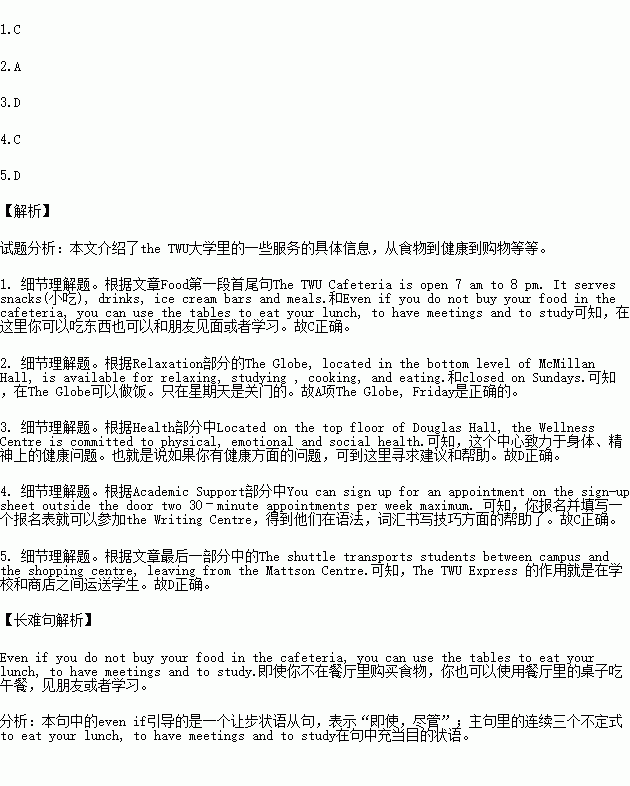题目内容
A Guide to the University
Food
The TWU Cafeteria is open 7am to 8pm. It serves snacks, drinks, ice cream bars and meals. You can pay with cash or your ID cards. You can add meal money to your ID cards at the Front Desk. Even if you do not buy your food in the cafeteria, you can use the tables to eat your lunch, to have meetings and to study.
If you are on campus in the evening or late at night, you can buy snacks, fast food, and drinks in the Lower Café located in the bottom level of the Gouglas Centre. This area is often used for entertainment such as concerts, games or TV watching.
Relaxation
The Globe, located in the bottom level of McMillan Hall, is available for relaxing, studying, cooking, and eating. Monthly activities are held here for all international students. Hours are 10 am to 10 pm, closed on Sundays.
Health
Located on the top floor of Douglas Hall, the Wellness Centre is committed to physical, emotional and social health. A doctor and nurse are available if you have health questions or need immediate medical help or personal advice. The cost of this is included in your medical insurance. Hours are Monday to Friday, 9 am to noon and 1:00 to 4:30 pm.
Academic Support
All students have access to the Writing Centre on the upper floor of Douglas Hall. Here, qualified volunteers will work with you on written work, grammar, vocabulary, and other academic skills. You can sign up for an appointment on the sign-up sheet outside the door two 30–minute appointments per week maximum. This service is free.
Transportation
The TWU Express is a shuttle service. The shuttle transports students between campus and the shopping centre, leaving from the Mattson Centre. Operation hours are between 8 am and 3 pm. Saturdays only. Round trip fare is $1.
1.What can you do in the TWU Cafeteria?
A. Do homework and watch TV.
B. Buy drinks and enjoy concerts.
C. Have meals and meet with friends.
D. Add money to your ID and play chess.
2.Where and when can you cook your own food?
A. The Globe, Friday.
B. The Lower Café, Sunday.
C. The TWU Cafeteria, Friday.
D. The McMillan Hall, Sunday.
3.The Guide tells us that the Wellness Centre _________.
A. is open six days a week
B. offers services free of charge
C. trains students in medical care
D. gives advice on mental health
4.How can you seek help from the Writing Centre?
A. By applying online.
B. By calling the centre.
C. By filling in a sign-up form.
D. By going to the centre directly.
5.What is the function of TWU Express?
A. To carry students to the lecture halls.
B. To provide students with campus tours
C. To take students to the Mattson Centre.
D. To transport students to and from the stores.

